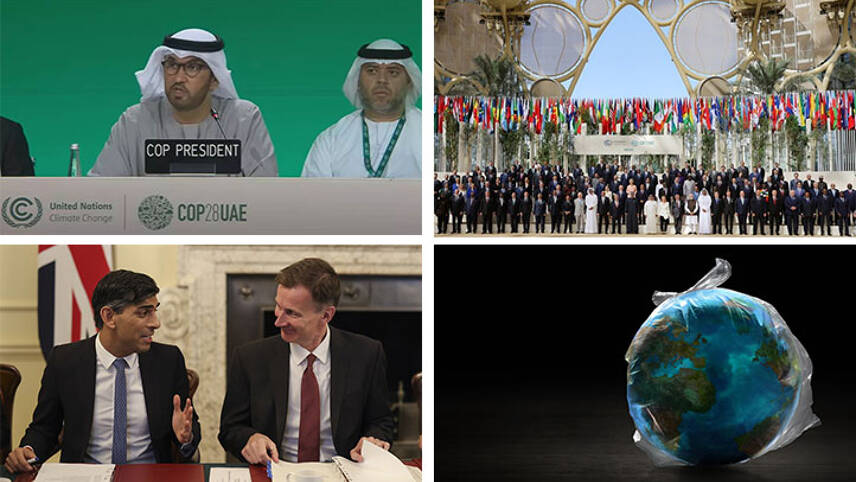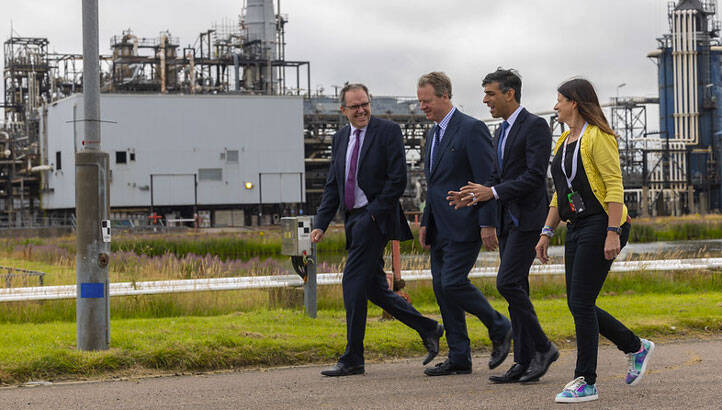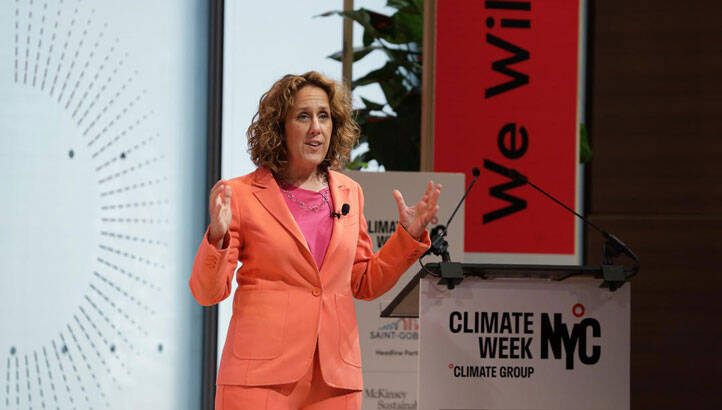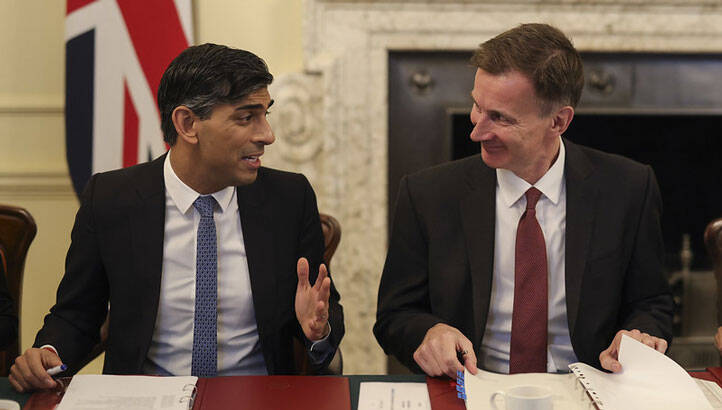This premium content is exclusive to edie Members.
To find out more about edie Membership, please click below.
If you are an existing member, login here

The edie offices will close for Christmas and New Year on Friday (22 December) but, before they do, our editorial team is leaving you with plenty of festive treats and reflections on 2023.
This two-part feature summarises our most-read stories for each month of the year, which is likely to be the hottest on record. From the Net-Zero Review being published in early January to the gavel coming down on the UAE Consensus at COP28 in Dubai earlier this month, this feature has all the headlines covered.
Read on for a brief explainer of the sustainable business stories that defined the second half of 2023.
The first part of this feature, including news from January to June, can be found here.
July: Tennis, the TCFD and oil licencing controversies

Pictured: PM Rishi Sunak and team visit a gas power plant in Aberdeen. Image: 10 Downing Street, CC BY-NC-ND 2.0 DEED
This month came with a tale of two narratives within UK green policy. The Climate Change Committee (CCC) published its annual progress report to Parliament as June came to a close, stating that the UK was losing credibility on the international climate stage and that Ministers had largely failed to close policy gaps on decarbonising key sectors including heat and buildings.
Prime Minister Rishi Sunak, meanwhile, seized the opportunity of Parliament’s summer recess to confirm a new North Sea oil and gas licensing round. MPs including Chris Skidmore argued that this decision should have been announced in the Commons, not in a TV news broadcast, to allow proper chances for scrutiny.
Our most-read corporate sustainability stories concerned the refillable and reusable packaging options on display at Wimbledon, and Surfers Against Sewage’s annual report on branded packaging litter. Once again, the NGO named brands owned by the Coca-Cola Company as Britain’s most commonly littered.
It’s also worth noting that, in July, the International Sustainability Standards Board (ISSB) confirmed that it would take over the Taskforce on Climate-Related Financial Disclosures’ (TCFD) monitoring work in 2024. The UK, a global leader in mandatory TCFD reporting, has signalled that it will support and align with the ISSB’s standards.
August: Earth Overshoot day and a new Energy Secretary
Earth Overshoot Day was marked as August began. This is the date at which humanity’s ecological demand exceeds the Earth’s capacity to regenerate its resources for that year. It represents the point at which we start living beyond the planet’s ecological means.
Rates of reuse and recycling have, worryingly, decreased as rates of extraction have increased. Circle Economy tracked a 7.2% reuse and recycling rate for its latest report, down from 9.1% in 2018.
Zooming in from the world to the UK, 21 August saw the Prime Minister conducting a mini cabinet reshuffle, in which junior Minister Claire Coutinho replaced Grant Shapps as Secretary for Energy Security and Net-Zero (DESNZ). Shapps was appointed Defence Secretary after Ben Wallace Resigned.
September: Climate Week NYC and young sustainability leaders

Pictured: Climate Group CEO Helen Clarkson opens Climate Week NYC 2023
September is always a busy month for the global sustainability conversation, with Climate Week held in New York to coincide with the UN’s General Assembly. UN Secretary-General Antonio Guterres also added an additional climate ambition summit to the mix for 2023, asking countries only to speak if they had credible, new, science-based plans.
A particularly important announcement was the launch of the finalised Taskforce on Nature-Related Financial Disclosures (TNFD) framework. Based on the TCFD, the framework provides organisations including businesses with guidance on measuring and disclosing their nature-related dependencies, impacts and risks.
Separately in global environmental diplomacy, the UN Environment Programme published the first draft of its Plastics Treaty. The agreement should be ratified in 2024, joining up efforts to reduce the production of problematic plastics and to boost recycling rates.
Across the Atlantic, the UK Government, blocked from speaking at the climate ambition summit, confirmed a string of green policy rollbacks, citing the cost burden on consumers. The Prime Minister axed forthcoming energy efficiency standards for rented properties; weakened low-carbon heating targets and pushed the ban on new petrol and diesel car and van sales from 2030 to 2035. An uplift in grant funding for home heat pumps was one silver lining in a plan that the CCC has warned could complicate the low-carbon transition in the long term.
At edie, we launched our new 30 Under 30 class, convening the next generation of sustainability leaders from organisations of all sizes and sectors for networking and celebrations. View a full list of class members here.
October: Transition Plans, energy policy and nature-based offsets
edie’s most popular news piece of the month covered the launch of the Transition Plan Taskforce’s (TPT) ‘gold standard’ for plan development and disclosure. The framework outlines how businesses can – and should – go beyond disclosing decarbonisation targets, backing them up with credible delivery plans including aspects such as investment and worker skills.
Readers were also keen to learn more about nature market principles developed in a bid to tackle greenwashing in nature-based carbon offsetting. The principles, jointly developed by four environmental NGOs plus Finance Earth and Federated Hermes, cover issues including additionality, permanence and verifiability.
October was also another busy month for UK green policy. The Energy Act received Royal Assent after an 18-month passage through Parliament that was complicated by multiple changes in Prime Minister and Energy Secretary. Read our explainer of what the Act includes here.
Party political conferences were also hosted, deepening dividing lines between the Conservatives, Labour and Liberal Democrats on climate and energy. The Conservatives dismissed low-traffic neighborhoods and ultra-low emission zones as well as alternative proteins. They also reiterated support for nuclear and offshore wind. Labour unveiled plans to ‘rewire Britain’ and to expand Gigafactories for electric vehicle batteries.
November: Outrage over King’s Speech amid final COP28 preparations

Pictured: PM Rishi Sunak and Chancellor Jeremy Hunt. Image: 10 Downing Street CC BY-NC-ND 2.0 DEED
In the final stretch before COP28 began, the UK Government sought to cement the green policy narratives displayed over the spring and summer into law.
Soon after came the Autumn Statement. Chancellor Jeremy Hunt provided an official response to the Winser review to increase grid accessibility as well as an additional £4.5bn in support to attract investment into “strategic manufacturing” sectors including electric vehicles. A lack of a comprehensive response to subsidy packages on offer in the US and EU, however, was a disappointment.
It was also a notable month for awards. Prince William announced the winners of the Earthshot Prize, providing £5m of grant funding to five climate innovators from across the world. And edie presented its inaugural Net-Zero Awards to individuals and organisations that are spearheading the transition towards a net-zero carbon economy. Read a full list of winners here.
As the month came to a close, the edie team travelled to Dubai to provide live coverage of COP28.
December: Covering COP28 live from Dubai

Image: UNFCCC Flickr / Mahmoud Khaled
Was it a case of good COP, bad COP or COP out? The UN’s annual climate summit, chaired by the UAE in Dubai this year, was mired in controversies about the involvement of the oil and gas industry.
But COPs don’t solely happen in the negotiating rooms. More than 100,000 people registered to attend COP28 and the edie team were on the ground to capture the daily happenings beyond the Plenary rooms, including the COP process’s first Business and Philanthropy Forum. We spoke with attendees from business decision-makers to grassroots organisers and youth campaigners.
You can recap on all of edie’s COP28 content here.
Our live blog proved particularly popular, as did our spin-off podcast series ‘COP28 Covered’.
We also hosted a free-to-attend online COP28 debrief, making sense of what the agreements will mean for businesses going forward. This can be accessed on-demand here.




Please login or Register to leave a comment.